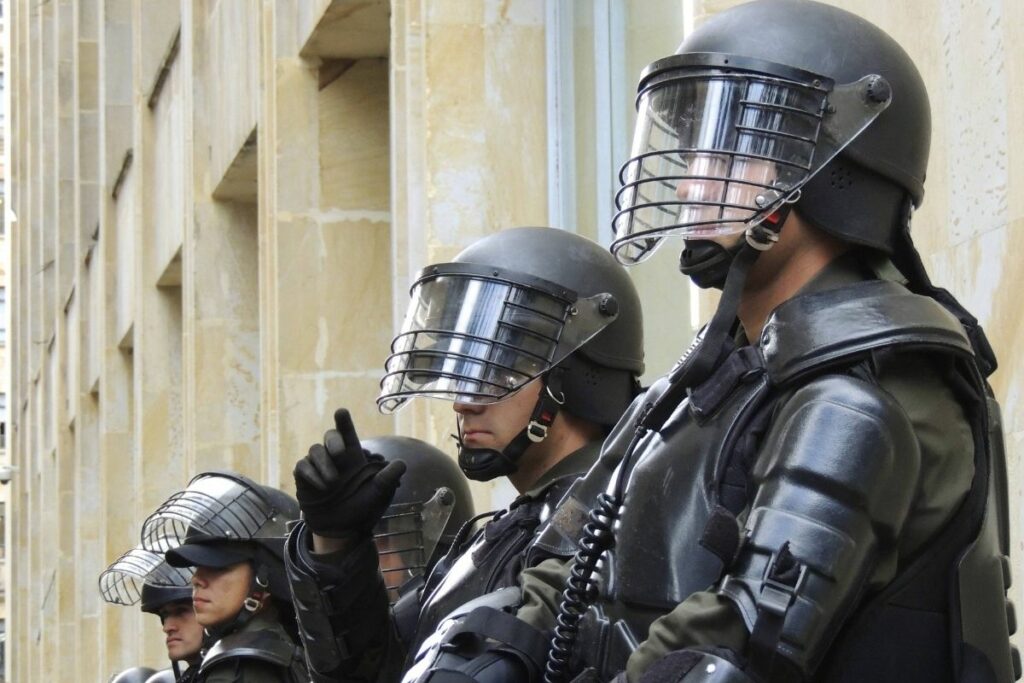Forces began to gather, ostensibly in preparation to combat protesters who have been occupying downtown Ottawa, the capital, for more than two weeks.
On Thursday, Ontario provincial police gathered outside Ottawa’s city center, perhaps in preparation for a predicted crackdown on protestors who have blocked Canada’s capital for three weeks.
Police officers were seen exiting a conference venue near the airport where they had assembled early in the morning. The police cars that had clogged a vast parking lot began to disperse.
Five city buses were observed idling on a street near the conference center, with police officers boarding at least two of them on their way to the city’s western suburbs. Police officers from the province of Ontario were observed congregating at big hotels in the region.
Construction workers put up 12-foot-high wire netting around the Parliament building downtown in the early morning rain, while demonstrators readied for police action. Andrew Broe was one among them, and he claimed the trucks were texting the protest leadership.
They were told to stay in their trucks, shut the doors, and not open them for anyone, including the police, he added.
Read More – Freemasonry treasures stolen by the Nazis on display in Poland.
Prime Minister Justin Trudeau called for the protesters to leave the House of Commons on Thursday. “These illegal and deadly acts, including here in Ottawa, must come to an end,” he stated.
A loosely organized group of truckers launched the protests weeks ago, protesting to a mandate that they get vaccinated whenever crossing the US-Canada border. With the support of right-wing activists, the protests grew into a larger movement against a variety of pandemic measures as well as Mr. Trudeau in general.
If the crackdown is implemented, it might help to end a crisis that has harmed Mr. Trudeau’s leadership and upset local communities and the economy. Truckers and their supporters obstruct trade and idle automakers’ plants by blocking key border crossings and other routes.
Some people in Ottawa blocked streets and harassed neighbors, causing a 24-hour cacophony in otherwise calm residential areas. There has been very little physical violence.
The sluggishness of the police response has irritated Ottawa citizens and many Canadians, and Ottawa’s police chief resigned early this week under criticism of law enforcement.
To put an end to the protests, Mr. Trudeau took the unusual step of declaring a national public order emergency – the first such proclamation in half a century. The action rolled out tougher police across the country, focusing on protesters’ fund-raising, which has been designated as a criminal activity, as well as their personal and company bank accounts.
Read More –Covid pill molnupiravir rejected by French health authorities.
Steve Bell, the interim Ottawa police chief, stated during a special City Council meeting on Wednesday that officers now have the tools and a plan to put an end to the demonstration. He would comment on the timing or specifics of the plan, citing operational concerns, but said officers were prepared to adopt methods “not seen in Ottawa” as part of a “lawful” escalation.
Mr. Bell stated, “We’re going to take back the entire downtown center.” “To terminate the occupation, we have an excellent, well-resourced plan.”
On Wednesday, police began delivering written notices to lingering protestors in Ottawa, advising them to leave or face penalties. A handful of the truckers are accompanied by their children, and according to one police notice, anyone who brings a youngster to an illegal demonstration faces up to five years in prison.
Some demonstrators have been accompanied by their dogs, and Ottawa city officials cautioned on Thursday that if protestors were separated from their pets during a police operation, the animals would be placed in protective custody at their expense for eight days before being “considered surrendered.”
Read More – United States is the biggest producer of plastic waste.
Final Lines
Four people were charged with conspiring to murder police officers on Tuesday, as part of a gang of 13 people accused of planning a violent retaliation if police attempted to break up a blockade of a border crossing between Alberta and Montana in the Canadian community of Coutts.
There have been hints that the protests are losing pace across the country, as government leaders and law enforcement officials, who were first hesitant to intervene, have taken a steadily firmer stance.
Border blockades have been lifted at Windsor, Ontario, which connects to Detroit; Coutts; and Emerson, Manitoba, which crosses into North Dakota on Wednesday.

